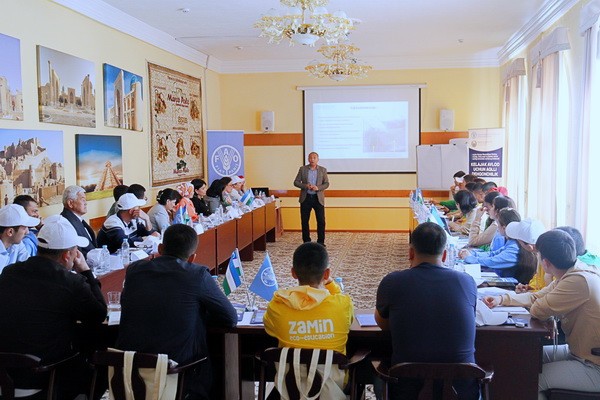News
FAO, together with MICHAUD and the Zamin Foundation, conducted greenhouse training in Ferghana
Tashkent, Uzbekistan (UzDaily.uz ) – A training with the participation of leading international and national experts was held in Ferghana for the youngest greenhouse enthusiasts – students of eco-schools, as well as their teachers. The classes are organized by the Food and Agriculture Organization of the United Nations (FAO), the Ministry of Preschool and School Education and the Zamin International Public Foundation within the framework of the joint project "Young Farmer" for schools participating in the Eu-schools Uzbekistan.The project instills in children a caring attitude towards nature, forms an understanding of global environmental problems and the possibilities of solving them at the level of each person.
One of the ways of environmental education has become classes in specially equipped greenhouses installed on the territories of eco-schools. Children learn to take care of plants, grow various crops with their own hands and thereby realize the value of natural resources and the need for their rational use. Earlier, 22 such greenhouses were transferred to specialized schools and eco-schools of the republic from the FAO regional project "Integrated Management of Natural resources in drought-prone and saline agricultural production landscapes of Central Asia and Turkey" - ISCAUSR-2.
Then 18 more greenhouses were installed, funded by the Zamin Foundation.
The training, which took place in Ferghana, was also organized with the support of the ISCAUSR-2 project and another FAO project – "Smart Agriculture for the next generation", which introduces new methods and technologies for growing crops in greenhouses. Both FAO projects are implemented in cooperation with the Ministry of Agriculture of the Republic of Uzbekistan.
The training was attended by students and teachers from 18 eco-schools located in different regions of the country.
"Environmental improvement is one of the four areas of improvement on which FAO's global activities are based according to the FAO Strategic Framework for 2022-2031. This area includes combating climate change, protecting ecosystems, rational use of natural resources, responsible consumption and much more. And we are pleased to contribute to the education of an environmentally responsible young generation," said Sherzod Umarov, Deputy Representative of FAO in Uzbekistan.
During the classes, FAO international expert Guido Santini presented to the participants a presentation on the implementation of the Smart Agriculture for the Next Generation project in Uzbekistan, telling how the introduction of new technologies has allowed to increase crop yields and significantly increase the incomes of rural residents of the Ferghana Valley, at the same time promoting environmentally friendly agriculture in the region.
The topic was continued by Khairulla Esonov, senior agronomist for greenhouse vegetable growing, an FAO specialist, who taught schoolchildren the basics of farming in protected soil. Special attention was paid to the issues of effective irrigation of greenhouse crops, climate management in the greenhouse and comprehensive pest control with minimal use of chemical pesticides, which allows you to grow healthy and high-quality products.
The training program included visits to two households located in the Dustlik mahalla and Novkent mahalla in the Ferghana district of the Ferghana region, where greenhouses optimized during the implementation of the FAO project "Smart Agriculture for the next Generation" are located. After visiting the villagers and visiting their modern and newly equipped greenhouses, the students were able to see and evaluate the effectiveness of new methods of greenhouse management, which they had previously been told about by specialists at the training. The students talked with the villagers, who cordially answered all their questions.
At this event, the event came to an end, and the young participants received not only a new body of knowledge, but also an understanding of how much time and labor food production takes and how important it is to take care of the environment and the rational use of natural resources.


